#this is so connected to how history and what history is are dictated by the west in ways that directly affect indigenous people and poc
Note
Platonic yandere shigaraki HCS with a younger sister who's the daughter of AFO? (Since he's readers adopted older brother since AFO adopted shigaraki)
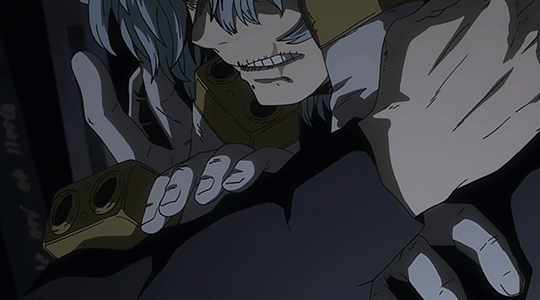
Yandere Older Brother Shigaraki Tomura
“This is the little sibling I was telling you about. Would you like to hold them?”
“But my quirk–!”
“Not this time. Trust me.”
It was hard not to pull his cradled arms away when AFO unswaddled and slowly lowered the baby down
Visions of his past
His quirk’s awakening flashed violent through his mind
Tightly shutting his eyes in fear
he feels the warmth and substantial weight in his arms
Opening his eyes to see a darling little baby cooing at him
Giving a gummy smile when he lets out a little chuckle in disbelief
“This is (Y/n). You’re little sibling.”
“My little-?”
“Yes. Will you protect them?
“YES!”
From then on it was history
It’s been him and his newfound family against the world
Even with his old notfamily he wasn’t the oldest
And now you’re immune to his power letting him connect with you in a way he just can’t with others
All that being said he’s a doting big brother
“(Y/n). Are you giving the nanny trouble?”
“Psh! It was only a mud pie!”
“Really? That doesn’t sound so bad.”
“They threw it in my face!!”
“It was meant for the pillow! Honest!”
“If (Y/n) said it was meant for the pillow then it was meant for the pillow I see no problem here.”
Because AFO is AFO the way you’re raised will really dictate how he watches over you
If he’s not the only one doting on you but your father dearest as well you can expect to always be miles away from the action
Kept in the boonies or shipped across the world
If AFO demands it you will see no such thing as a world he doesn’t create
But if you’re just another tool of his then you both will start to get competitive
“Awww heard about the little incident in Kamino! Heard you couldn’t get the job done!”
“And I heard about your little excursion with the American division.”
“Pft! it was more so just a distraction.”
“Oh yeah? Is your enemy weakened and out of the game for good?”
“Grrrr.”
“That’s what I thought little Padawan!”
“Grrr shut up!”
If AFO completely ignores you and keeps you only because Tomura wants it
Or because you have too many features like your late uncle
He’s dealing with a rebellious little sibling that he’s intent on tracking down
Whether you’ve decided to side with the heroes or strike out on your own
He will make it everyone’s problem that you’re not in his custody
“You seem to forget (Y/n) that as your older brother, I’m going to protect you…whether you like it or not.”
In whichever universe you are the apple of his eye
And he refuses to let you leave it
Whatever plan AFO has for him can wait if it doesn’t mean you safely within his grasp
#yandere x reader#yandere x you#lovelyyandereaddictionpoint#yanderexrea#yandere#yanderes#yandere bnha x reader#yandere bnha#yandere mha#platonic yandere x reader#platonic yandere#yandere platonic#yandere brother#yandere big brother#yandere tomura shigaraki#yandere brother shigaraki#yandere brother tomura shigaraki#yandere tomura#yandere shigaraki tomura#yandere shigaraki
1K notes
·
View notes
Text
Situationship
*Warning: Minipulation, Toxic relationship, depression, stalking, power imbalance, abuse, dead dove, toxic, obsessive reader, delulu reader, I'll add tags that you guys think I should add.
Read at your own risk.
Male reader!
This is how I imagine Alastor gets a partner
Alastor
A bit of time with Rosie for some gossip did wonders for Alastor, especially since he's been gone awhile.
Can you imagine his curiosity of a sinner called (M/n) is quickly climbing up the social ladder? A new Overlord seems to be quite famous from what he has heard.
When he finally meets you in the Overlord meeting room, his eyes seems to stay on you.
The sinner who is dressed so... cheap. This is your first impression? He has to call you out on it of course.
The insults from him irrated you so much over the past few months that you decided to change your wardrobe. He wants style? Fine.
The next time you see each other, Alastor can't help but smile wide in victory. This he could get used to.
With that, the more he interacted with you, the more desire you felt for him. The familiar feelings of your human self is returning, that feeling of sweaty palms, heart thumping, and scenarios inside your head play wonderful interactions with him.
That glance he gave you? He was totally checking you out!
Oh! He's questioning about the extermination? You need to jump in and support your man!
Alastor has noticed the change immediately of your bored hollow self to this Vox like persona. No, worse than Vox.
Sure Vox has cameras around to keep an eye on him but you... you were basically crawling at his feet with a tail wagging behind you.
Like a mutt, eager to please even if he says something out of pocket towards you. It seems he can't get you off his back unless he kills you.
But that will be unproductive. You are an Overlord no matter if you were new to the scene. You must be powerful and he doesn't have history with you unlike Vox.
This is a chance for him he can't miss out on so he'll play along a little.
He'll give out compliments as rewards for you when you comply his orders like a treat to a puppy.
Slash at you when you step out of line, for example trying to hold his hand. You pout up at him, not getting up from the ground, wallowing in sorrow. You disappointed him.
Next time you're around him, you don't touch but stay close. Almost purring when he pats your head with a 'Good boy. You're a fast learner.'
That was it. That is what you wanted to hear. The snap inside your head connected that you're his as much as he's yours.
No matter how much you flinch when he initiate physical contact, your mind tricking you as excitement of affection from the man.
But sometimes, you return to that hollow person. The one that stares off to space. The one Alastor seems to get the most entertained from.
This switch is something he can't predict but its always fun to watch.
That glaze in your eyes as you talk to someone. Imitating aura oozing out as you seem to get more aggravated towards everyone around you.
The way you display your powers sends tingles down his spine, especially when he's the only one that can snap you out of that trance, looking up at him like some sort of god.
And you do. Which is the reason why you sold your soul to him.
But not so fast, you are an Overlord for a reason though. The contract was thoroughly read and rewritten which was unfortunate for Alastor.
It seems like this contract was more of a...relationship term. Alastor had a decision to make and if he didn't like it, nothing can stop him from leaving.
But.
'Alastor, the owner of the soul, can dictate expectations, boundaries, and responsibilities within the relationship. (M/n), the seller of said soul, must obey and follow the guidelines and maintaining it.'
What a waist of power if Alastor doesn't agree.
It's a good thing he does though.
Cause you'll be lost once again to that hollowness if he doesn't.
A blast of green and (f/c) crashes around them both. A thick silver chain around your neck connects to the other side of the chain which Alastor holds on to, the handle rusty heart shaped.
'Now let the fun begin'
#male reader#x male reader#hazbin hotel#hazbin alastor#hazbin hotel x male reader#alastor x male reader#alastor x reader#hazbin hotel x reader#hazbin rosie#hazbin vox#hazbin lucifer#hazbin vaggie#hazbin angel dust#hazbin charlie#hazbin niffty#hazbin vees
118 notes
·
View notes
Note
i read somewhere that, after the war, zuko at least hands hama over to the swt instead of keeping her in fire nation prisons 'till the end of her life. Which is nice, I think. But I'm also curious as to how that would work out.
Most notably: how do you think it'd go down if she were to meet Pakku? given they both have some sort of connection to kanna's life, the idea of them being forced to interact even once entertains me very much. like, old waterbending master pakku—white lotus member—who has grown up in a patriarchal society and actively forbidden women from training to fight, under the precedent they are somehow ontologically weaker, fragile, and belonging in the healing huts... THAT guy, meeting his former fiancé's old friend: (or current wife's if you go by canon, which, eugh) A woman who not only fought in the front lines but ended up becoming one of the most skilled, creative, and deadly waterbenders in history. How would he react when finding out that a woman came up with blood bending? How badly would Hama mind-fuck him?? Because I'm confident they'd hate each other's guts-- no way she'd tolerate him,,,
And on a similar note—how would Kanna feel upon reuniting wirh Hama and discovering what she put Katata through, in your opinion? Idk, I'm just full of puppetmaster thoughts today. Hama is incredibly interesting and I wish she wasn't handled so much like a Halloween Specisl creepy witch, (even though katara herself is handled and written pretty well in this episode, i think. but i digress.)
i mean obviously i think about this all the time. i personally think that zuko hands hama over to the swt upon katara's request, and she and aang personally deliver her on appa (sokka is not there, for the very deliberate reason that if he knew what they were doing he would very vocally disapprove). and so katara is sort of retraumatizing herself by doing this, but she also feels like it's necessary specifically because she needs to be able to look hama in the eye and tell her why they're not actually the same (especially now that she actually did bloodbend someone in cold blood). katara has the love and support and safety to step back from her anger and her pain and her grief and hang onto her own humanity and allow herself to be the bigger person even in moments of abject rage and acute trauma, and hama doesn't. hama is a victim of her circumstance, and that's part of what makes her so uniquely terrifying to katara, because katara has that same capacity to make people hurt, she has the same tools at her disposal, and she has the same justifications to exercise that power. but unlike hama, she hasn't actually been pushed past her limits. sometimes she can see the cliff's edge, and sometime she even teeters on the line, but hama was fully just shoved off without a parachute, and that's really what separates them above all. i think katara should be allowed to acknowledge that and forgive herself for that, even if hama doesn't directly apologize to her (although in my mind she does, and it's not enough, but it's also so much more than katara ever expected to hear). even if it is too late for hama, katara deserves to heal.
frankly, i don't really give a shit about pakku or his reaction to hama. i also don't actually think that he thinks woman are ontologically incapable of being talented waterbenders of whatever; he's a pretty worldly guy, the reason he clings to these traditions isn't born of the belief that they're grounded in logical evidence like sokka's is, it's because he believes in the preservation of a system that benefits and valorizes him. pakku thinks katara belongs in the healing huts because he comes from a culture that dictates that women belong in the healing huts. like, he might also subscribe to the bioessentialist logic that women are better healers and men are being fighters, but that honestly doesn't really matter, because (unlike sokka) his epiphany lies not in the fact that woman can fight, but in the fact that his role in upholding these systems has actively driven his loved ones away due to his cruelty. he decides to be kinder, to women and in general, because he realizes that being an asshole has negative consequences. but frankly, who cares what he thinks of hama. realizing that your sister tribe in the south deserves aid and protection after being subjected to a century of genocide is kind of too little too late imo. unlike katara, sokka, aang, or kanna, who can approach this situation from the perspective of being a genocide survivor who even remotely understands hama's trauma, pakku really has no place in this conversation to me.
as for kanna...... god. hama/kanna reunion is genuinely one of the most heart-wrenching concepts to me in all of atla. as a sidenote, hama/kanna fanfic goes so hard every time. there's a total of like 15 fanfics for them on ao3 (last i checked) but they're all sooooooo. fucking delicious. tide locked........... ugh. anyway. i cannot fathom kanna's reaction upon learning that her closest friend once upon a time is not only alive, but also a convicted felon, for crimes including but not limited to manipulating her granddaughter, violating her (and sokka's) bodily autonomy in cruel and perverse ways, and forcing her to participate in that mode of violence in a way that traumatized her forever. even if you don't read them as former lovers (although it is indubitably better that way) it's so gut-churning. kanna lost so many people over the course of her life, and to learn that one of them has returned but in the worst way possible must be mind-boggling and distinctly unreal. like how do you even process that. first, how do you process how much pain she must have went through to become the kind of person who is capable of doing this, and then, how do you process the knowledge that the person you once loved most in the world irreparably hurt the person you now love most in the world? obviously she would always prioritize katara's safety over anyone else's no matter what, but god. kanna has led such a fascinating and impossibly difficult life, and it's not over yet.
#kallianthi#asks#analysis#postwargaang#hama#katara#pakku#kanna#hamaxkanna#hama&katara#also i didn't mention it in the post itself bc i've talked about it before but yeah i very much agree that i wish hama had been framed#differently because i do feel like making her into a cackling witch kind of undermines the whole point of the episode#she's someone who is deserving of our empathy and understanding despite her violence and by reducing her into a caricature#we lose that nuance#but otherwise it's such a fascinating episode....#kataraaa.... katara i love you katara <33333
87 notes
·
View notes
Text
Armand surgical malpractice meta (spoilers for TVA)
It’s, at least from what I’ve seen, a pretty popularly agreed upon conception that Armand’s mutation of Claudia b4 her death as described in TVA didn’t actually happen..partly bcus it’s such a drastic and grotesque retcon from her death in interview with the vampire so lots of ppl don’t want to address it as canon, and partly bcus it’s so bizarre and seemingly unprompted in context that it just seems more plausible that Armand would make this up as some sort of twisted shock value rather then actually do it. I used to buy into this theory and never rlly thought about it beyond that, and today for the first time I thought about it deeply and realized. Damn I rlly disagree! I think that Armand 100% canonically chopped Claudia’s head off and sewed it onto an adult body. I believe it happened as told. And I have many reasons !
First and foremost I don’t think that Armand is actually capable of lying so deliberately in this context. Interpreting most tvc narrators as potentially lying to our faces and intentionally twisting events to suit a narrative and a purpose of dictating our perception of them is, I think, accurate and justified, and smth I love about this fandom. Everyone is not to be trusted 100%, especially Louis and Lestat, who are said and implied many times to have completely fabricated some events in the books for the sake of painting a picture. Tvc serve as this over arching plot about multiple conflicting characters manipulating events of their lives to suit a narrative that we as the audience can pick apart and discover the truth within. Very much “this bitch said WHAT about me?? that dumb cunt is always spreading lies smh, it actually happened LIKE THIS” (they r both not telling the full truth). Armand however is very much an outlier here, and it’s part of what makes TVA so unique as a chronicle. It’s a big part of his character throughout the series, in TVA and leading up to TVA, that Armand’s way of thinking is so dysfunctional and his memory is so flawed (bcus of all his trauma) (and neurodivergence) (imo) that he isn’t able to fully conceptualize the events of his life as chronological and meaningful in the way that one would need to do to be able to write a memoir.
He can’t describe events in broad strokes, or wrap his head around a vast emotional impact in a way that is explanatory or intentional. Think of that conversation he has with Daniel in queen of the damned, where he explains that he isn’t capable of telling Daniel what his life in the past “was like” because that’s a concept incomprehensible to him. He only knows what happened, not what it was like, not how it affected him or how it shaped his personhood, what it means etc. It’s a form of dissociation almost. The vampire armand is the first time in Armand’s vampiric life that he self reflects beyond acknowledging events and his emotions in that moment, it’s the first time he attempts to make connections and understand himself in a way that is narrative and structured and not fragmented bits of history and A names. Part of this requires further dissociation. I definitely get the impression that since Armand is being so vulnerable in a way he is so unused to, yet is so significant, he is unable to register while he’s talking that not only David, but millions of people including every vampire in the world, will know what he says. He’s just laying himself completely bare, he’s talking and talking and only once he finishes realizes oh. Oh. everyone’s going to read this huh. It’s so cathartic he doesn’t consider that in the moment. It’s the first time he’s ever been capable of reckoning with his life in a self reflective way, of looking at it and explaining it and reasoning with it, structuring it in order, not fragments, etc, seeing the cause and the impact and touching on an overall conclusion (tho he never entirely gets there). These baby steps are so difficult for him already, and considering this part of his character I really think it’s a stretch to say that Armand would be capable of the thought process in his book of pure venting to go “maybe I should twist the truth here or change this or add this or lie about this so people will think of me this way or so Lestat can see this, etc” TVA is unreliable, more so bcus of how mentally ill armand is and how little he understands his own life and emotions, but not deliberately like iwtv and tvl. Armand even says that the book was for Benji and Sybelle, but it’s so unfiltered and horrific and vent-like that this sounds ridiculous. He doesn’t even have his stated audience in mind while he’s telling his story, let alone his broader audience. The audience was a complete afterthought, a barely registered consequence. So why would he lie about Claudia? How would he be capable?
it’s another common piece of conversation around this part of TVA where we go, Armand discusses how he never would want to tell this to Louis bcus he knows how badly it would hurt him, so why did he describe it so graphically? Well, cause of all I mentioned. It seems pretty clear to me that armand is almost haunted by the affair with Claudia, and he has no way of lying about this, so his descriptions seemed very much to me like a desperate bit of venting. He has never told anyone how horrific it actually was and it’s always been in his mind, so he just lets it all out. Makes sense, but the broader question is, if Armand wasn’t lying…why did he do that at all?? This I think is so interesting.
To understand this I had to think a lot about Armand’s motivations for killing Claudia at all, which is well, simply, revenge against Lestat and claiming of Louis without barriers. If Claudia dies Lestat will be sad and Louis will be mine and mine alone 👍👍 etc. but Claudia’s mutation was not rooted in either of these motivations, which is part of why it’s so shocking. He didn’t do it to hurt Lestat, lestat never found out. It just seems so odd and unprompted. But once I thought more about why Armand hates Lestat, and why he wants to hurt him by killing Claudia, it started to fit into place. Armand’s hatred for Lestat is rooted very much in his twisted resemblance to Marius that he perceives as being very strong and basically mocking. When he first sees Lestat in tvl he’s repulsed by him instantly bcus he sees him as this parody of Marius, this beautiful blonde man in striking red robes who boldly and carelessly defies the laws of vampires established by the children of Satan as if they are meaningless to him, revels in the indulgent world of humans like he belongs there, shamelessly as armand devotes himself to miserable repression. It strikes a nerve for armand, feels very personally offensive to him, like the embodiment of the traits that got Marius’s destroyed r coming back to mock him in his face. And then as he gets to know Lestat more deeply he only hates him more, bcus Lestat is not only bold and careless, but he’s immature and stupid, and he knows nothing. Armand in his horribly traumatized mind set registers Lestat as “like Marius” and takes this to mean “maybe he can save me, maybe he will teach me and free me from this hell, guide me and give me the purpose I need to be given.” But Lestat does not do this, lmfao. He actually destroys any sense of purpose armand had, rips him from his safety net, and when Armand begs for guidance, asks to be allowed to travel alongside Lestat so he can learn to be a person again, Lestat denies him. The only purpose he bothers to give him is the scraps, symbolic of his perverse indulgence that Armand despises, and fucks off. Lestat is grotesquely reminiscent of Marius, in the worst ways. It’s like his presence alone opens Armand’s eyes to how badly Marius has ruined him. He was the sun, the purpose, the guiding light, and then it was ripped away, and there was nothing else without him. Just a void.
So Armand hates Lestat for this very personal mockery of his own plight, and this hatred spirals into unbridled rage when Lestat returns to him and expects Armand to give Lestat the assistance that he denied him. Not only this, but Lestat found Marius, found marius and was granted guidance and love that Marius refused to give Armand after his indoctrination into the children of Satan. And Marius told Lestat to never ever do what he did, never make an Armand, because Armand was a mistake, he was too young to be a vampire, and now he’s a mistake he will never forgive himself for. And with this immense privilege that Armand spent a huge chunk of his life yearning for, guidance from Marius when he was his most lost, Lestat decides to disregard it. He decides that since Marius said it was bad to turn a child as young as Armand, he’d turn a child even younger then Armand, just cuz. He is once again the embodiment of Marius’s sins, the grotesque parody. Marius turned a teenager, Lestat turns a five year old. It’s almost cruel in how mocking it is, almost intentional in how personal. So Claudia is this child, this deliberate mistake made by someone who knew her turning would be harmful to her but was selfish enough not to care, then went on to regret it when he has to reckon with the consequences. Seem familiar? Armand sure thought so. So I imagine that being alone with Claudia, looking this deeply sad reflection of his own agony in the eyes, knowing she is about to die for justice against a warped parody of his Maker, for the sake of punishment for her own existence, I imagine this struck a cord of insanity in Armand’s fucked up mind, caused him to loose his absolute shit for just long enough to go what if I can fix her, what if I can turn this narrative around, give her the remarkable ending I know deep down that she, I , will never be granted. What if I can give her a body that will reflect her mind? What if I can make this abomination into a miracle? No wonder he pulled out the surgical tools 😭 No wonder he was so horrified by his own actions when he came to his senses, no wonder he refused to share this, kept it to himself for so long, until he finally broke and confessed it all in a desperate moment when he was too caught up in the dam breaking to realize he’d be exposing this horrific action to the world.
Armand sees Claudia as a repulsive mistake that should’ve never existed made by Lestat to deliberately mock him up until the surgery, when then for only a moment lost to time ended in blood she is another child who had her life taken from her too soon by an egotistical blonde man who thought he could play god with someone’s life. “They were done for anyway, he was going to starve to death in a brothel, she was going to die as a street orphan, the blood would be a service to them, a chance they never had” But they both know that’s a lie they tell themselves to justify the act of taking a child and molding it into what they please for fun, for pleasure, for companionship, just to see what would happen. Armand sees this for a moment and wants to give her a chance, give them both a chance, wants to see her as an adult, as someone who could have a life. And then of course, we know how that turns out 😭
#Bursts into tears#I have a concussion and I’m supposed to be resting my brain but fuck it armand more important then healing god damn it#tvc#the vampire chronicles#vampire chronicles#vc#armand#lestat de lioncourt#iwtv#interview with the vampire#claudia iwtv#Claudia tvc#Armand iwtv#Armand#armand tvc#marius de romanus#the vampire lestat#the vampire armand#tvl#tva#tvc meta#iwtv meta#louis de pointe du lac
150 notes
·
View notes
Text
Zelda and the Tale of Melusine
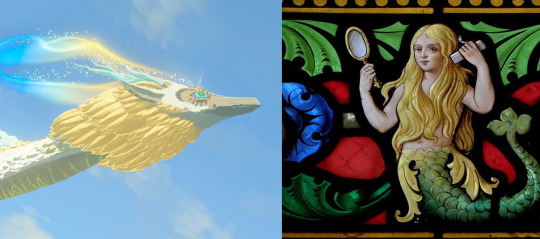
I'll be looking at the parallels between Zelda's arc and some Medieval tropes of female metamorphosis, using Melusine: Or the Noble History of Lusignan as an example. Specificially a translated copy of Jean d'Arras's version, since that's the most well known one.
To start, a run down of Melusine:
She's a half human, half fairy woman cursed by her mother for imprisoning her mortal father in a mountain. The curse dictates every Saturday she turns into a serpent from the naval down. She must marry a human man for a long time to slowly undo the curse and become fully human, but he must never see her monstrous form beforehand.
If he does, she'll lose her humanity forever and transform into a dragon.
She meets a knight in the woods, he suspects her otherworldly knowledge comes from "some phantasm or diabolical power", to which she goes don't worry about it kitten. But he likes her so he's like ok! ^_^ yay!
She keeps giving him cool fairy advice, and with it his life magically becomes a whole lot better - he gains wealth, power, and not just him but other people listen to her advice: crops flourish, castles are built. The kingdom is thriving! They love her just as much as he does, so it's no surprise they get married. But there's just one condition, she hides in the bathhouse every Saturday, and he's never to visit or peep at her.
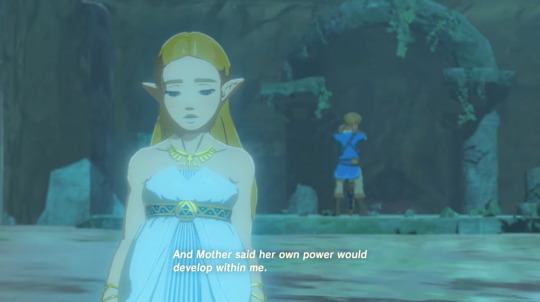
He breaks his promise and discovers her secret. She says he's cursed both of them, and now he's lost her forever: "Be sure that as long as you live I shall always find pleasure in seeing you; but [...] never again shall you see me in female form."
The next passage is as follows:
'Melusine, uttering a very doleful cry and then a heavy sigh, leapt from the window into the void, and as she swept across the orchards she metamorphosed into a massive dragon some fifteen feet in length. [...] In her dragon form she circled the fortress three times, and each time she flew past the window she uttered such an excruciating, desolate cry that everyone wept for pity, knowing that she was leaving under constraint and against her will. Then she disappeared in the direction of Lusignan, letting out such rueful shrieking and strident cries that wherever she passed it seemed as if lightning and thunder were about to split the sky.'
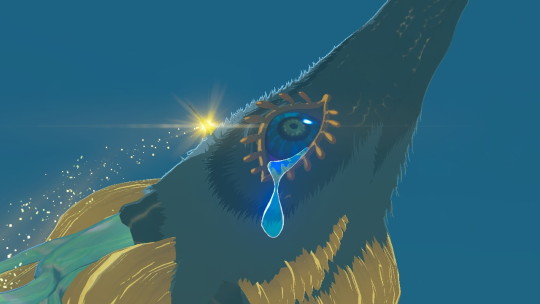
He never sees her again after that. But phantoms of her start appearing in the castle, secretly visiting her children at night and generally just spooking people by standing there menacingly. And that's how the myth is born.
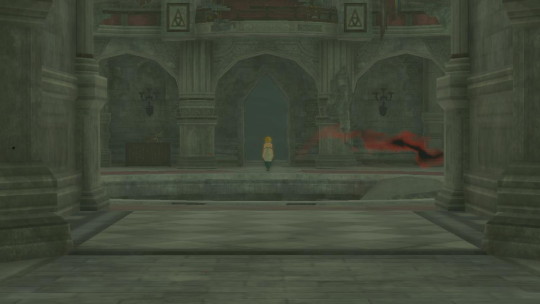
I've already drawn connections through the images above, but what's the point of this?
Like lots of other fans I was irked by the whole 'zelda jesus' thing in totk, yeah it is a little odd that everyone follows her advice without question, and it's never wrong.
I'm curious, if the team was drawing from Western myths, that this was supposed to echo the fae. Especially since most of the quests keep you on your toes on whether this was the real Zelda giving advice, or a fake - a phantom(!) - deliberately sabotaging them. It mirrors how opinions on Melusine were split between a benevolent fae or a demon. Splitting them into two entities though, I can see how that would defang it.
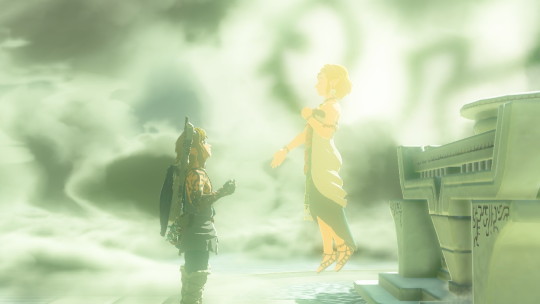
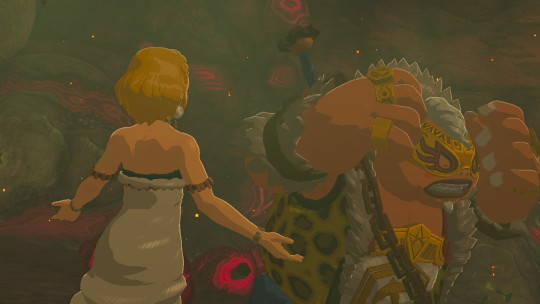
The og text wasn't exactly that nuanced either. I remember my prof joking the message amounted to "always listen to your weird snake wife!" Maybe we SHOULD listen to our weird snake wives.
It's interesting Melusine only interacts with children after the curse - botw+totk imply only young children who are pure of heart can see dragons.
I recommend reading the whole thing if you can find it! Then you can look for more parallels, and read riveting pieces of dialogue such as this:

#totk#totk zelda#legend of zelda#tloz#tears of the kingdom#loz#totk thoughts#tloz totk#zelda tears of the kingdom#totk spoilers#light dragon#totk light dragon#botw dragon#totk dragon#totk theory#zelda theory#melusine#that's why i named my golden horse melusine#also i find it ironic this medieval text gives its woman more agency than totk zelda ever got :') where did we go wrong
136 notes
·
View notes
Text
How 'Percy Jackson and the Olympians' pulled off Poseidon and Sally's emotional diner chat
Virginia Kull and Toby Stephens talk about shooting episode 7's pivotal scene.
By Belen Edwards on January 27, 2024
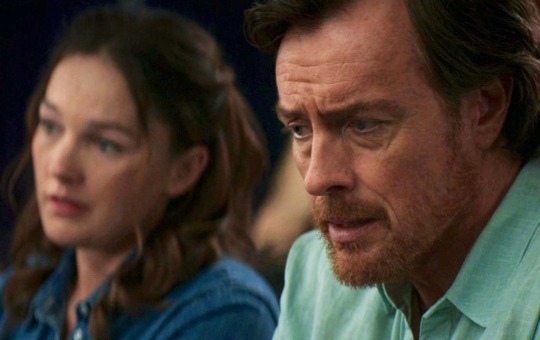
Percy Jackson and the Olympians is a rollicking fantasy adventure, complete with frightening monsters, high-stakes battles, and gods pulled straight from Greek mythology. So it may come as a surprise that one of the show's best — and most talked-about — scenes is a quiet discussion between two parents.
Of course, these aren't normal parents. One is the Greek god Poseidon (Toby Stephens). The other is mortal Sally Jackson (Virginia Kull), who has spent the last 12 years preparing her son Percy (Walker Scobell) for his heroic destiny — and protecting him from the world of the Olympians.
Like many stories from ancient legends, Sally and Poseidon's relationship is a tragic romance. Separated by circumstances of literally mythic proportion, unable to raise Percy together because Olympian law dictates that Poseidon shouldn't even have a child, their story has no clear solution. Sally carries the burden of the truth about Percy's parentage, while Poseidon is unable to help without endangering both his son and the woman he loves. It's a tough dynamic to understand solely through Percy's eyes, but in episode 7, "We Find Out the Truth, Sort Of," Percy Jackson and the Olympians offers us a bigger window into Sally and Poseidon's connection, in all its painful messiness and surprising beauty.
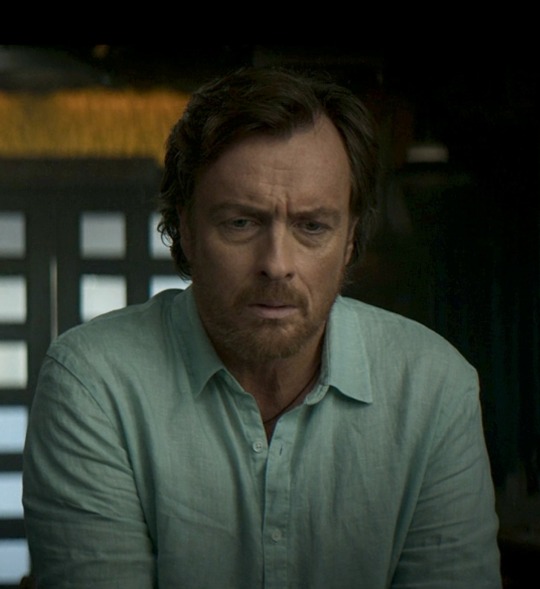
"We Find Out the Truth, Sort Of" marks our first introduction to Poseidon and what his relationship with Sally really looks like. Because of this, our first glimpse of Poseidon in the flesh is not some bombastic display of godly power, but of a man and a woman simply talking in a diner about the difficulties Sally faces in raising Percy alone.
"It was a really clever way to introduce their relationship and introduce Poseidon, because it makes them very human," Stephens said of the scene in a video call with Mashable. "It's a domestic scene between a mother and father, and at the heart of it there's this pain. It's a yearning between two people to be connected who can't be, but Poseidon is also yearning to be connected with his son but can't because he's protecting him."
The diner scene was the first scene Stephens shot for the series, yet the chemistry and history between Poseidon and Sally were already well within reach for the actors. "I really liked working with Virginia, and she's a really great actress," said Stephens. "We found that very quickly. The scene just had a very intimate feel."
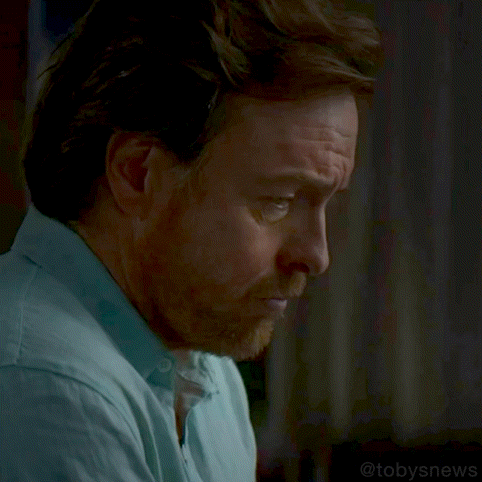
Percy Jackson and the Olympians began creating that sense of intimacy between Sally and Poseidon right from the very first episode, with a scene that sees Sally sitting on her fire escape, taking in the rain.
Kull was incredibly excited to see the fire escape scene when she first read the script. "In television, you typically don't have time for things like quiet, ordinary moments. And this seems like a humdrum moment, but I think it tells such a huge story," Kull said. "It's not just Sally sitting in the rain on the fire escape — she's sitting in the rain communing with the great love of her life and the father of her kid, and this is the way that she feels close to him."

The diner sequence feels like a natural progression from that fire escape moment. Sally and Poseidon are connecting in both, but there's still a distance between them. On the fire escape, Poseidon isn't actually present. But even when he's next to Sally in the diner, there's a tragic divide between them. They're close, but still far apart.
Director Anders Engström achieved this paradoxical nearness by telling Kull and Stephens to play the whole scene without ever looking at each other. For Kull, that became a key to unlocking the power of the diner scene.
"What that did to us as actors was that all of the feelings of, 'I need to see how this is affecting the person that I'm speaking to, I want to know what he thinks about what I'm saying,' we couldn't act on," Kull explained. "Therefore, the desire to be heard, to be understood, and to connect was so heightened and so charged, it was electric. It meant that any bad impulse to 'perform' went away, and I was just desperately listening to and clinging to what he was saying. Even the silences were powerful."
In these silences, where Sally and Poseidon sit shoulder-to-shoulder yet never look at one another, Percy Jackson and the Olympians builds an entire world of a relationship that, up to this point, we haven't fully understood.
"Because Poseidon has been absent for the whole show, the audience is going, 'What a jerk, this guy is this absentee father.' And then when you meet him, you go, 'Right, I get it. It's much more complicated, and actually he really does care,'" Stephens said. "This scene is not in the book, but I think it's needed in the TV version, because it gives you much more context."
#toby stephens#virginia kull#percy jackson#pjo cast#sally x poseidon#posally#poseidon#pjo fandom#pjo
112 notes
·
View notes
Note
Hello sex witch! I hope i am not disrespectful or annoying in sending this ask. Im a mid 20s straight dude who has never had any sexual experience, and i know people constantly say that it doesnt define me, that i shouldnt base my self worth on that, but the fact is it is incredibly alienating to be an adult who simply does not participate in what for most people seems to be a normal part of adult life. I want to have sexual experiences, but at this point im afraid i am like… too broken to start? Like who would want to initiate a sexual experience with someone like me yknow? I guess im asking for advice in how to overcome this kind of thing and begin having a sex life. Even if you can’t provide much advice, I’m hoping that if you post this, maybe other people in my situation will feel a little less alone. Love and light to you <3
hi anon,
this isn't disrespectful or rude at all, and I'm glad you're willing to reach out for advice about this! I often worry that I'm missing the 20-something straight dude demographic, but I'm glad to know some of y'all are out there, because you deserve compassionate conversations about sex as much as everyone else does :)
I'm gonna say this right up front: you're not broken. nobody is! whenever you find yourself worrying that there's something about you that would make any potential partner go running, I want you to imagine the situation were reversed. if a woman you were attracted to told you something about herself that was the same thing you're ashamed of in yourself, would you stop being attracted to her?
in this case, would it be a dealbreaker for you that someone else hadn't had any previous sexual partners? would you think they were broken and unfuckable, or would you see that as just one aspect of a person who's much more than their sexual history?
if you wouldn't feel negatively about a partner having that trait then I'm sorry, you're not allowed to hate it in yourself! them's the rules!
listen: very rarely does a person pick a sexual partner because of their extensive sexual resume. people connect over shared interests, over similar senses of humor and values, over bonds that can be formed in a second if the vibes are right. most people won't care how many other partners you've had; they'll care if you seem interesting and dynamic and worth getting to know more in a carnal manner.
listen: ultimately, you have very little control over whether or not you have sex. it's largely a matter of luck and coincidence unless you feel like paying someone to have sex with you, which is a fine thing to do - sex workers need to make rent, after all. but what you can control is how you show up in the world, how you express yourself, and how you interact with others. cultivate yourself. dedicate time to your interests, take loving care of yourself, learn to do things that make you happy without shame, practice being a good friend and conversational partner, take risks that let you have fun outside your comfort zone.
in short, focus on the areas of your life that you can control rather than dwelling on the ones dictated so heavily by chance. the best case scenario is that you become the sexiest, most interesting person alive; the worst case scenario is that you enjoy life more fully whether you have a partner or not.
also, hey: for what it's worth, studies pretty consistently find that most people tend to WILDLY overestimate the amount of sex that other people are having while considering themselves below average. the truth is that you're unlikely to be nearly as much of an outlier as you worry that you are.
90 notes
·
View notes
Text
"I have heard of such things"
“Please, your Majesty, I came in through a wardrobe.”
“A wardrobe? What do you mean?”
“I—I opened a door and just found myself here, your Majesty,” said Edmund.
“Ha!” said the Queen, speaking more to herself than to him. “A door. A door from the world of men! I have heard of such things."
Thinking about this line from LWW (chapter 4). Jadis reacts to hearing Edmund came from another world by musing about rumors, even though she's from another world herself, and has in fact been to London (albeit briefly). Obviously the reason is because C. S. Lewis wrote LWW before MN and didn't care about super tight continuity, but that's no fun, so here are some in-universe possibilities:
it's been centuries since Jadis came to Narnia, and she's the type who ignores anything that isn't useful to her (e.g. ignoring Polly because Digory was the one that woke her, and then acting like neither child exists once they've brought her to Uncle Andrew). Charn is dead and she can't get back to Earth so she just…didn't bother to think about them ever again. By the time of LWW she can barely remember other worlds exist
Jadis barely knows other worlds exist, not because she didn't bother to remember, but because of some magical/physical reaction. Jadis has no memory of the Wood Between the Worlds once she's out of it, even though Polly and Digory do. Maybe Charnians just react that way to interdimensional travel, or maybe it's something specific to Jadis herself due to magic she's done. But whyever, Jadis forgets any world but the one she's in. The Wood fades almost instantly because she was there so briefly and has no personal connection to it. Earth would last a little longer, and Charn longer still, long enough that she can remember them during the end of MN. But by the time of LWW, she doesn't remember how she came to Narnia.
or she doesn't remember due to eating the silver apple? immortality comes with a price, and for better or worse Jadis is now bound to Narnia; she cannot go back
Telmar was founded by humans who stumbled through from Earth, and perhaps other places were as well (we don't know the histories of Galma etc). Or maybe solitary travelers find their way in sometimes, not enough to found nations or influence history but enough to leave rumors, rumors that Jadis is listening for very carefully because she knows four humans are prophesized to destroy her
Jadis doesn't mean a door as in "portal to another world" but door as in "hole in the magical barrier I've put up around Narnia", and thinks Edmund slipped in from another country. This would mean she doesn't understand the word "wardrobe" though. Then again Mr. Tumnus didn't know it either, so maybe they just don't have wardrobes in Narnia. (There's no absolutely no evidence in the books that Jadis made a barrier around Narnia, but there must be some sort of outer limit to her powers, or Archenland, Calormen, etc would also have been under her control, and they don't seem to have been. She was "Queen of Narnia", not "Queen of the World", and the countries mentioned in HHB all seem to be running normally without the sort of chaos caused by setting up governments again after a dictator's death. I can imagine Jadis making a magical line around Narnia's borders (with plans to expand, ofc) so her magic has a set space to focus on; maybe she can even sense when someone crosses it, which is why Edmund's arrival surprised her—he didn't trip any alarms.)
my favorite: Narnia herself is doing her best to fight Jadis. While the Pevensies are ruling Narnia, their lives on Earth become like a dream, and there are hints the reverse happens when they go back. But when they return to Narnia, "the air of Narnia [works] on" them to make them who Narnia needs them to be: the Kings and Queens of Old. Maybe it's working on Jadis, as best it can. It smoothes away her memories of other worlds, making her content to stay here, like it did the Pevensies. But for the Pevensies, it was a way to ease the pain of suddenly losing their old lives, whereas for Jadis, it's trying to keep her complacent. Because if she remembers there are other worlds, she'll try to find doors to them, and conquer kingdoms, and find more magic, and raise armies, and be that much harder to free Narnia from. Narnia is in pain and fighting Jadis the only way it can till Aslan and the Pevensies come to save it
#feel free to add on; i wanna hear everyone else's theories#the chronicles of narnia#jadis (narnia)#narnia headcanons#well more like#narnia theories and spitballing#nova actually posts stuff#the higher the queuer
32 notes
·
View notes
Text
to me, the question of whether hera would want a body is first and foremost a question of autonomy and ability. she has an internal self-image, i think it's meaningful that the most pivotal moments in her character arc take place in spaces where she can be perceived the way she perceives herself and interact with others in a (relatively) equal and physical capacity, and that's worth considering. but i don't think it's about how she looks, or even who she is - and i think she's the same person either way; she's equally human without a body, and having a body wouldn't make her lived experience as an AI magically disappear - so much as it's about how she would want to live.
like most things with hera, i'm looking at this through a dual lens of disability and transness, both perspectives from which the body - and particularly disconnect from the body - is a concern. the body as the mechanism by which she's able to interact with the world; understanding her physical isolation as a product of her disability, the body as a disability aid. the body as it relates to disability, in constant negotiation. the body as an expression of medical transition, of self-determination, of choice. as a statement of how she wants to be seen, how she wants to navigate the world, and at the same time reckoning with the inevitable gap between an idealized self-image and a lived reality, especially after a long time spent believing that self-image could never be visible to anyone else.
it's critical to me that it should never imply hera's disability is 'fixed' by having a body, only that it enables her to interact with the world in ways she otherwise couldn't. her fears about returning to earth are about safety and ability; the form she exists in dictates the life she's allowed to lead and has allowed people to invade her privacy and make choices for her. dysphoria and disability both contribute to disembodiment - in an increasingly digitized world, the type of alienation that feels like your life can only exist in a virtual space... maybe there's something about the concept of AI embodiment, in particular as it relates to hera, that appeals to me because of what it challenges about what makes a 'real woman.' when it's about perception, about how others see her and how she might observe / be impacted by how she's treated differently, even subconsciously. it's about feeling more present in her life and interfacing with the world. but it's not in itself a becoming; it doesn't change how she's been shaped by her history or who she is as a person.
i think it comes back to the 'big picture' as a central antagonistic force in wolf 359, and how - in that context, in this story - it adds a weight to this hypothetical choice. hera is everywhere, and she's never really anywhere. she's got access to more knowledge than most people could imagine, but it's all theoretical or highly situational; she doesn't have the same life experiences as her peers. she has the capacity to understand that 'big picture' better than most people, but whatever greater portion of the universe she understands is nothing next to infinity and meaningless without connection and context. it's interesting to me that hera is one of the most self-focused and introspective people on the show. her loyalties and decisions are absolute, personal, emotionally driven. she's lonely; she always feels physically away from the others. she misremembers herself sitting at the table with the rest of the crew. she imagines what the ocean is like. there's nothing to say that hera having a body is the only solution for that, but i like what it represents, and i honestly believe it'd make her happier than the alternatives. if there's something to a symbolically narrowed focus that allows for a more solid sense of self... that maybe the way to make something of such a big, big universe is to find a tiny portion of it that's yours and hold onto it tight.
#wolf 359#w359#hera wolf 359#idk. processing something. as always i have more to say but it's impossible to communicate all at once#it's a meaningful idea to me and i think there's a LOT more that can be done with it thematically than just. the assumption of normalcy#so much of hera's existence is about feeling trapped and that's only going to get worse on earth and within these two contexts#that's something i really feel for. especially with. mmm.#i don't like the idea that who hera is is tied to the way she exists because it seems to weirdly reinforce her own misconception#that there can never be another life for her.#and all of these things are specific to hera and to the themes of wolf 359 and NOT about AI characters in general#in other stories there are other considerations.#the best argument i can make against it is that she says getting visuals from one place is weird and she doesn't like it. but that's#a totally different situation where it's a further limitation of her ability without a trade off. it's a different consideration i think#when it allows her more freedom. to go somewhere and be completely alone by herself. to feel like she has more control and more privacy#to be able to hug her friends. or feel the rain. it would be one thing if she felt content existing 'differently'#but she... doesn't. canonically she doesn't. and i think that has to be taken into account.#i think you can tell a meaningful and positive story about disability without giving her physical form on earth too#but i think it has to be considered that those are limitations for her and that the way she exists feels isolating to her.#idk. a lot of the suggestions people come up with feel like they're coming from a place of compromise that i don't think is necessary#there are plenty of ways that having a body would be difficult for hera and i guess it's hopeful to me to think#maybe she'd still find it worth it.
152 notes
·
View notes
Text

"Win all the Battles, Lose the War"
by Yuval Noah Harari
Who wins the Israel-Hamas war? It depends, of course, on how you define victory. In a soccer game, the side that scores more goals wins. In a war, the winner is not necessarily the one who kills more people, takes more prisoners, destroys more houses, or conquers more territory - the winner is the side that achieves its political goals. In the Iraq war, for example, the Americans won all the battles, occupied the entire country, captured Saddam Hussein and completely toppled his regime - but the war ended in a crushing political defeat for the USA and Iran becoming the "proprietor" in Iraq and the most powerful country in the Middle East. The existential threat that hovers over our heads today is partly a consequence of the American "victory" on the battlefields in Iraq. It could happen again. If we don't get our policy goals right, we could win all the battles and lose the war.
So in the current war, who is closer to achieving their political goals? To answer this question, one must first know what the political goals of the parties are. Hamas' goals are quite clear. In the immediate term, Hamas's goal on October 7 was to sabotage the agreement that was being forged between Israel and Saudi Arabia. It's a bit hard to remember, but in the weeks before October 7 it was reported that Israel came very close to the possibility of a historic peace with Saudi Arabia, which would normalize relations between Israel and most of the Arab world and fundamentally change Israel's position in the world. Hamas stopped that.
In the longer term, Hamas' goal was to sow seeds of hatred in the minds of millions, to ensure that for generations to come there would be neither peace nor normalization between Israel and the Arab world. Hamas planned to carry out a particularly cruel massacre, and even took care to photograph and document the atrocities, in order to cause the Israelis as much pain as possible. Hamas assumed that Israel would respond to this massacre with tremendous force, which would also cause immense pain to the Palestinians. This was all a conscious part of the plan. The name that Hamas gave to its attack indicates its intentions. The attack was called "Tupan" - the flood. Like the biblical flood that destroyed humanity, Hamas intended to wreak havoc on a biblical scale.
Does Hamas not care about the suffering that this war has inflicted and continues to inflict on Palestinian citizens? Hamas supporters certainly have different feelings and opinions, but the organization's basic worldview does not attach importance to human suffering. The highest goals of Hamas are dictated by religious fantasies. For Hamas, Palestinians who are killed in the war are martyrs, who now enjoy heavenly pleasures in heaven. As more people die, there are more martyrs who enjoy heaven. And as far as our physical world is concerned, from the point of view of a fundamentalist organization like Hamas, human society on earth can have only one goal - uncompromising loyalty to heavenly principles of purity and justice. Since in order to make peace one must always compromise on justice, organizations like Hamas reject any opportunity for peace, and demand that people will fight at any cost for absolute justice and absolute purity.
This, by the way, explains the apparently strange phenomenon of radical left-wing organizations in Western democracies that absolve Hamas of any responsibility for the atrocities in Israel and the humanitarian disaster in Gaza, and lay the full blame on Israel alone. The connection between the radical left and Hamas is the belief in absolute justice, the unwillingness to accept the complexity of this world, and the division of the world into pure good facing absolute evil. Justice is a noble goal, but the claim to absolute justice inevitably leads to endless war. There was not a single peace treaty in the history of mankind that did not require compromises, and that provided absolute justice.
Finally, Hamas' actual grand plan was that its surprise attack and the Israeli countermeasures would set the West Bank on fire, lead to an uprising of the Palestinian citizens of Israel, and also drag Hezbollah, Iran and other forces into the war, who together might land a blow on Israel that would shock and perhaps even destroy the country. This is the flood that Hamas wishes for. So how close is Hamas to achieving its goals?
As far as preventing an Israeli-Saudi agreement and destroying any chance for future peace and normalization between Jews and Arabs - then Hamas is very close to victory. As a matter of fact, Hamas has already achieved far beyond what it hoped for, because it has succeeded in sowing hatred not only in the minds of millions of Israelis and Palestinians, but also in the minds of hundreds of millions more people all over the world. Antisemitism is on the rise, while Israel's international standing is at an unprecedented low, even in the Western democracies that have been our allies for years. Every additional day in which Palestinians are killed or starved in Gaza advances Hamas another step on its path.
As far as dragging more forces into the war, so far Hamas' success is much more limited. But time plays in their favor. Hamas has already bet the whole jackpot, and even if so far they have not won the big prize, the roulette is still spinning. Every day a battle between Israel and Hezbollah, and every confrontation on the Temple Mount, are another round of the roulette. One wrong decision or a rocket that hits the wrong place may realize Hamas' grand plan and bring forth the flood.
And what about Israel? Do our tremendous sacrifices and the IDF's achievements on the battlefield bring us closer to our political goals? Even if Hamas has achieved some of its goals, perhaps we have also achieved some of our goals, so that a draw can be declared? These questions are very difficult to answer, because the Netanyahu government manages this war is without defining political goals. The government repeatedly says that the goal is to eliminate Hamas. Israel of course has a full right and even obligation to protect its territory and its citizens. The elimination of Hamas' military capabilities is also essential in order to open the way to future peace and normalization, because as long as Hamas possesses significant military power, it will use it to thwart any serious attempt at an arrangement. Whenever we get close to an agreement, Hamas will attack, as it did on October 7. But even if Israel succeeds in disarming Hamas, that is a military achievement, not a political goal. As stated before, the Americans in Iraq eliminated all the military power of Saddam Hussein and collapsed his regime, and still suffered a crushing political defeat. In 1982, Israel invaded Lebanon to eliminate the threat of Fatah. The threat of Fatah was successfully removed - and in its place we got the threat of Hezbollah. Does Israel have an orderly plan that explains how defeating Hamas leads to saving the peace treaty with Saudi Arabia, to a sustainable arrangement in Gaza, to the restoration of our international status, or to some other desired political goal? Without such a plan, it is impossible to make military decisions such as whether to attack Rafah or to cease fire.
When we have to choose between an attack in Rafah and a ceasefire, it reminds me of Alice in Wonderland who came to a crossroads and wasn't sure whether to turn right or left. She asked the Cheshire Cat which way she should go. The cat said to her: "Where do you want to go?" "I don't know," replied Alice. "Then," the cat decided, "it doesn't matter which way you choose." If we don't know where we want to go, how do we know if the road there leads through an attack in Rafah or through a ceasefire?
So does Israel have political goals in the war? It seems not. Some of the members of the government are captive to their own biblical visions and dreams of divine revenge and absolute justice. The prime minister, for his part, has not given a single speech since the beginning of the war in which he articulates his political vision, and it seems that this vision is summed up in one and only one goal: to retain his seat. The October 7 War extends by a month and another month, and the Hamas-ian flood threatens to drown the entire region in blood. It is impossible to wait until after the war to establish an alternative government that does have a political vision. The war is only a tool to achieve political goals. Letting a policy-less government lead a war is a sure recipe to defeat. No matter how many victories are achieved on the battlefield, and at what cost, it is impossible to translate a military victory into a political achievement if there is no policy.
Political goals are also essential for Israeli hasbara. If Israel chooses to initiate a certain military action, there are three main ways to justify it. It can be argued that this is revenge for October 7. That won't convince anyone but ourselves, because even our greatest friends think we've had enough revenge. It can be argued that everything we do is to free the hostages. It no longer convinces even the families of the hostages, certainly when only three were released militarily. The alternative is to present a political plan to the world, and explain why additional military operations are necessary to realize it. As long as the Israeli government does not present a political plan, Israeli hasbara has no chance of convincing world public opinion. And who knows, if we finally define political goals, maybe we will discover that there is no need at all for more military operations to fulfill them?
For all these reasons, it is necessary to immediately establish a government that has a political vision, based on striving for a sustainable compromise and not on biblical fantasies and demands for absolute justice. And if you insist on some biblical fantasy, then here is one: at the end of the flood, a dove with an olive branch in its beak arrived. Of course, after the October 7 massacre, compromise and peace seem completely impossible. But such things have happened before.
30 years ago, in 1994, a terrible massacre took place in Rwanda reminiscent of the horrors of October 7. In one day the Hutus tortured, raped and murdered thousands of Tutsis - men and women, elderly and children. Entire families and villages were wiped off the face of the earth. It was a horrifically brutal killing spree, with machetes, hatchets, hoes and clubs. The next day, it happened again. And the next day, it happened again. And the next day, it happened again. What the Israelis experienced on the terrible Saturday of October 7, the Tutsis experienced for about a hundred consecutive days between April 7 and mid-July 1994. It is estimated that during these hundred days the Hutus murdered about 800 thousand people and raped hundreds of thousands of women. The massacre ended when the Tutsi resistance movement defeated the Hutu army, and took control of Rwanda. About two million Hutus fled the country. 30 years later, peace reigns between the Tutsi and Hutu. The Tutsi leadership led a process of reconciliation and healing, and accepted back to Rwanda the vast majority of Hutus who fled. Today Hutu and Tutsi live together in peace in Rwanda, which is considered one of the most peaceful and prosperous countries in Africa. Recently it has even become a popular tourist destination. People fly on vacation to Rwanda and visit picturesque villages in the hills where Hutu and Tutsi live together, and the tourists are unable to believe what happened in their vacation spots just 30 years ago. If they succeeded, maybe we have hope too.
Jewish history can also teach us similar lessons. On October 7, many Israelis, including several members of my family and friends, experienced horrors reminiscent of the darkest moments of the Holocaust. But eight decades after the Holocaust, Germans and Israelis are now good friends. It is important to emphasize that healing processes such as those between the Tutsis and the Hutus and between the Jews and the Germans are not based on achieving absolute justice. How is such justice possible? Can anyone bring the corpses back to life, or put the scream back into the throat? As a historian, I know that the curse of history is the attempt to save the past. This attempt stands no chance. We cannot save the past. We must focus on the future. We need to heal the wounds of the past, instead of using them as an excuse for more and more new wounds.
After hundreds of thousands of Palestinians lost their homes in 1948, Arab countries expelled hundreds of thousands of Jews from their territories. Since then, wound haunts wound in a seemingly endless cycle of blood. But we don't have to continue this cycle indefinitely. There is a possibility of stopping it, as can be learned from the behavior of Palestinian citizens of Israel. When Hamas gave the signal for the flood, it hoped that the Israeli Palestinians would join the circle of blood and attack their Jewish neighbors. Many Jews - and quite a few Arabs - lived in fear that this was exactly what was going to happen. In practice, the behavior of the Palestinian citizens of Israel since October 7 is a ray of light in the darkness. On October 7 itself, some of the Palestinian citizens of Israel were murdered by Hamas while trying to help the Jews, such as Abd al-Rahman Al-Nassara of al-Kasifa, who was murdered by terrorists when he came to rescue survivors from the [Nova] party, and Awad Musa Darawshe of Iksal, who was killed near Kibbutz Re'im while helping the wounded. Every day that has passed since then, tens of thousands of Palestinian citizens have continued to serve faithfully in all the institutions of Israeli society, from hospitals to government offices, while their friends and relatives in Gaza face death, refugeehood and hunger. The chairman of the Joint List party, Iman Odeh, denounced the October 7 massacre, saying that these were "horrific scenes that cannot be described. I cannot accept that in the name of the Palestinian people innocents are being killed in this way," and Ra'am Chairman Mansour Abbas called the massacre "an inhumane and unjustifiable act that goes against the values of Islam," and said that "the armed Palestinian organizations should lay down their weapons" and strive for peace with the State of Israel.
In order for all of us to have a real chance to get out of the cycle of bloodshed, the first step is to define a clear political goal for this war. Hamas has such a goal: to eliminate any chance of peace between Israel and the Arab world and the Palestinians. Israel's goal should be no less clear: to maintain the chance for peace. If Israel succeeds in disarming Hamas at the military level, but is left without a political horizon, then Hamas has defeated us.
#ישראבלר#been sitting on this opinion piece for a couple of days and finally got around to translating it#once again i'm glad that i don't waste time on writing my own pieces here#first and foremost because nobody cares as i've come to learn#but secondly because israeli peace activists just do it so much better than i ever could#anyway here's the daily prayer that bibi and his coalition end in prison as soon as possible a fucking men
21 notes
·
View notes
Photo


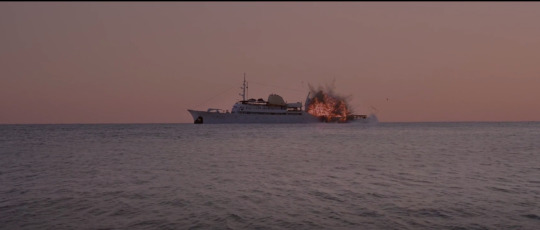


How people perceive themselves is nothing that interests me. There are very few that are gonna look in the mirror and say: The person I see is a savage monster. Instead, they make up some construction that justifies what they do.
And there it is. You're rich, so you're a philanthropist, so you can cure your conscience for not paying enough in tax. Not contributing enough to society.
And I recall, I was seven years old walking into the kitchen to find my mother crying inconsolably. Martin Luther King had been shot. Two months later, she was crying again. Bobby Kennedy was killed. I couldn't know then what I know now, that the invisible thread connecting Martin Luther King, the Kennedy brothers, and Malcolm X, was that in each case, my government had their finger on the trigger.
My government murdered Martin Luther King, Malcolm X, Bobby Kennedy and John F. Kennedy. My government overthrew good, honest, democratic leaders of the people in Chile, Venezuela, Argentina, Peru, El Salvador, Nicaragua, Panama and Bolivia. Along with Britain, we carved up the Middle East, creating artificial geological boundaries and installing puppet dictators. War itself became our most lucrative industry. Every bomb that is dropped makes somebody millions of dollars. You don't have to know where those bombs are exploding. You don't have to see the grieving mothers and the mangled bodies of their children.
Eugene Debs gave this speech in Canton Ohio, in 1918: "Throughout history, wars have been waged for conquest and plunder. The master class has always declared wars. The subject class has always fought. They've taught you to believe it to be your patriotic duty to go to war and to have yourselves slaughtered at their command. - Triangle of Sadness. (2022) dir. Ruben Östlund
#capitalism#socialism#poisonedsequin#fashion's equipoise#movie#film#movie quote#film quote#triangle of sadness#ruben ostlund#woody harrelson#screencaps#2022#film 2022
232 notes
·
View notes
Text
Aliens learning of Eldritch Horrors: Lovecraft Mythos
I’m a huge fan of H.P. Lovecraft horror. I know most of the big stories and smaller ones. Cthulhu is horrifying, but honestly there are worse. The big man is one of the saner entities out there.
So I recently pulled down a Lovecraft story book from my shelf and was going back through the stories, and it made me think: how would aliens react to hearing these stories? The idea that reality is simply the dream of one ancient forgotten god, including the lesser gods. I mean, if you actually read them there is some wacky shot in there. A mythos centered around the mysteriousness of the unknown, and a true hell hidden behind blissful ignorance.
Then I thought, “what if aliens discovered these things and had their own mythos?” What if every species has stories like these, but humans have the largest collection of them all? Perhaps aliens know that these things are true, but keep their distance. Then they discover humans and their extensive experiences with these ancient evils. Then aliens do something stupid and humans reveal big secrets yayyyy. Now I’m just spitballing.
Written from the perspective of an alien historian charged with cataloging traces of the Lovecraftian mythos.
WARNING: Depictions of violence, blood, and suicide.
~~~~~~
The tales were old as time. Older than the most ancient of civilizations within the cosmos. Some evidence could always be found within every culture. Whether an art piece, an artifact, or an oral story. But all knew how to deal with such things: leave it be.
As alien races began to connect and introduce their cultures, it became apparent there was more out there than we ever imagined. But we also knew better. We catalogued the tales, the artifacts, every scrap of evidence of these ancient beings, and then we ignored them. If any of the stories were true, we needed to heed the warnings.
But we were not prepared for the Terran race. Humans. A strange alien race from a death world long thought to be uninhabitable. Now found to be beautiful. While smaller and weaker than most races, they make up for it in their cunning and wild attitudes towards the universe. Many races fear their eagerness and unimaginably huge ego, while others welcome it. Such races usually burn out quickly without interference from others. But Humans were… different. They knew how to survive, even their own kind. When we added their knowledges to our libraries, many thought it would be the data we needed to spread into the cosmos.
How wrong we were.
It was an acolyte in charge of sorting through the new data that found it all. The stories. The mass knowledge of the unknown. More than that, they were first hand experiences of the ancient evils thought to be mere myth. Yet here it was. More accumulated knowledge than every race combined.
Granted, the stories told no more about these things than others did. The difference was the accuracy. How the Humans chose to write down every piece of literature and oral history they could remember. It was remarkable. For many a klick then we sat scrounging through these tales, rewriting and translating the words.
The more we read, the more we realized what all this may mean. The Human stories dictated these ancient creatures living on their world, Terra, aka Earth. Countless inscriptions of encounters with unknown beasts and horrors. Yet when asked about such things, the Terrans only shrugged. They said that those stories had long been dismissed as ravings of the old. If such things existed, they would have found them.
It was shocking to find the young race so ignorant of these things, even though we were guilty of the same crime. But we placated ourselves, claimed we only had bits and pieces whereas the Humans had an entire network of evidence. But the Terrans did not care. These were bed time stories to them.
We dove deeper and found that while most Humans dismissed the evidence, there were many who still believed. We were warned against finding those that held more evidence and knowledge, even ancient practices of this lost culture. The humans that believed such things had created communities of wild religious belief, cults that were not afraid to defy human societal law. They were labeled extremely dangerous.
But we dove. We leaped. And we didn’t even look underneath us. We became guilty of doing the one thing Humans were known for without realizing that we were not human. We did not have their instincts nor their rationalization and wild zeal. Their immortal adventurous youth.
We did what we were warned against. We sought out a cult. These humans welcomed us, celebrated with us, danced wildly. They spoke even stranger. They seemed to think we had come not to document their history and knowledge, but to welcome the “old ones” as well. We soon realized we had “jumped from the frying pan and into the fire” as humans would put it. We walked into a deeper hell.
We were shown histories, stories, artifacts, more evidence than a historian could dream of. It was a zircasian mine, to put it plainly. The humans did not defend or act cautiously as we expected. They rejoiced. When asked why, they relented that other humans were skeptics “destined for the black pits” but that they knew we understood. They expected us to help them in some way.
It was horrifying. It was hell. It was worse than any religion could damn their evil to. The humans had tricked us. They took my colleagues, split them open and bled them dry. They committed such horrible acts upon the many colors of blood I dare not write them for others to read. The worse came after.
It was indescribable. I can only depict what I understood. The humans danced and writhed in my colleagues blood as I and Yina’sa watched. They kept us alive to “bear witness to the return.” It was as if the fabric of space was torn, contorted, ripped apart to reveal the hidden void. Black tentacles and appendages slithered out, mouths full of teeth and fangs on the skin. But the worst was the eyes. The eyes of these ancient beasts. They were eyes of all races, yet not. They glowed and swirled, power emanating like a beating heart drumming in my ears. The humans still danced and chanted, screeching with sick delight. The chanting became “unearthly”, deep and strange. As if the humans were no longer just the ones chanting.
That was when I closed my eyes. I tried to block out the sounds, tried to pretend I was anywhere but there. I heard Yina’sa screaming, then laughing her Urulian laugh. She was screeching and cackling just as the humans were, shouting hideous things in her native tongue. I just wanted it to be over, over over Over OVER OVER OVER OV-
Then gunshots. True screams. Then a cosmic screech. As if the universe was crying out in pain. The ground shook. But I kept my eyes shut. The chanting was still repeating in my ears, I could t make it stop.
I barely remembered what happened afterwards. I had to be informed by my rescuers, a team of human soldiers. They had caught wind of our escapade, and had tried to reach us before it was too late. But alas. They had dragged me from that cavern, the only survivor.
I found out that Yina’sa had struck her head against the floor until her skull split open. To find out I was the only survivor among my group was…not ideal.
The humans informed me that they cult we had contacted was one that had been under surveillance for years, suspected of extreme violence and illegal obscenities. The human governments tried to warn us against contact knowing these humans we violent and dangerous. They knew these stories were not false. They had tried to dissuade us for our safety.
But we ignored them. Now blood is spilled, and I shall never forget those blood curdling screams, nor the chant the still beats in my head.
Nah’ka thm da
Nah’ka thm da
Nah’ka thm da
~~~~~~
Wow I kinda went off the rails. Wanted to write about aliens discovering humans having eldritch evidence, then trying to keep humans from finding the eldritch beasts. But then it turned into alien hubris and humans keeping the aliens away from the shit. Surprisingly this was kinda tame compared to my other posts. And for those wondering, I have more Humans are feral stories lined up, don’t worry about it.
Hope you all enjoyed. I wrote this feverishly at 10am, so I apologize for grammar and spelling mistakes.
Let me know if you have other suggestions for stories, and if you want me Lovecraftian stuff. Love writing about eldritch monsters.
#humans are crazy#humans are deathworlders#humans are fucking feral if you fuck with a cat#humans are insane#humans are space australians#humans are space orcs#humans are terrifying#humans are weird#lovecraft#eldritch#Lovecraftian mythos#h p lovecraft#eldritch monster#eldritch monsters
829 notes
·
View notes
Text
Jimin, Jungkook, the military etc.

Since the announcement of their enlistment till now, I had to bite my tongue not to scream sometimes at the insanity, above all regarding Jimin. My goodness all the Jimin would get bullied, I’m worried about him, from antis and his own fans, insanity. I get antis wishing that to happen to him, but his fans. Have you ever considered that the contrary may happen? Have you ever heard about the Jimin effect out there? Men and women falling for your idol? Have you heard about that effect on black, white, brown, short, tall, bald, long hair men? Show hosts being mesmerised, were you there? Suga himself in his show told you that Jimin had the capacity to pull at people’s heart strings. Do you remember the effect on his own members? All of those people were human beings. It may come as a shock to you but despite the codes, rules the military is made of human beings.
And you are telling me that the first thing they will think by watching Jimin, whose music they grow up with, even against their will, his smile, his kindness is to bully him because they will be bored and wanting to make him pay for being young and successful? You’re telling me they will choose to attack him without thinking of the repercussions or Jimin finding them outside and hiring people to beat the shit out of them? They wouldn't choose to be kind to use his connections, fans (the girls), hope for a job, etc. Yes, the world is full of POS and with extreme conditions people could lose it. But you forget something, BTS renewed their contract, they are Hybe assets (I know they’re human beings!) business-wise, and there is no way Hybe would let their boys get damaged mentally and physically. They have insiders, whistleblowers who will love to have a quick pay to alert them of anything.
How can they have insiders, the army is strict bla bla? The Korean army is strict with its soldiers, but the Korean army is part of Korean society. It’s not like people can’t get their way in Korea with connections, money and power. Are we talking about the same Korea? Which was built on corruption with the chaebols? A democracy which is doing worse than countries who had dictators putting their family in charge, and kidnapping people in their house, in terms of corruption? A country where corrupt ties between Korean businesses and Korean governments run deep? That wouldn’t allow a private company to have eyes on his famous employees in the army? No favours, really? Why do you think BTS went to Saudi Arabia for the weather, only for the fans? Nothing to do with deals between the two countries? And Hybe wouldn’t have asked something in return?
Even if Hybe didn’t ask, a military official in charge of overseeing BTS training and service wouldn't like anything happening to them under their watch. That’s a career suicide. The whole world would look at it, scrutinise the army and articles would pop up left and right. Korean doesn’t want to be embarrassed for failing to take care of the biggest boy’s band in their history. So, no, I’m not worried. It will be tough but Jimin will be fine, they all will be. One doesn’t have/send famous people in their army without taking precautions and being prepared.
Jikook had noble reasons to go together that I stated here, they can rely on each other, but what if Park Satellite Jungkook imagined his Jiminie hyung in a military base, surrounded by hundreds of soldiers complimenting his smile, willing to help him cut his meat, calling him cute, and he said, where is the companion enlistment form, I need it right now? Lol.
43 notes
·
View notes
Text
Lore Olympus this week is whole lot of OOOOHHHH FFFFFUUUUUCCCCCKKKK!!!!!

No sooner has Apollo taken over than he starts cleaning out the dissenters, starting with Eros and Psyche. You know, like a real-world dictator!
Medical gods so corrupt? Why does the American Healthcare system come to mind? Oh yeah.... insurance.
Thank you, Eros, for pointing out the blatant repeat of history.
Oh, and just in case E&P won't be silenced...
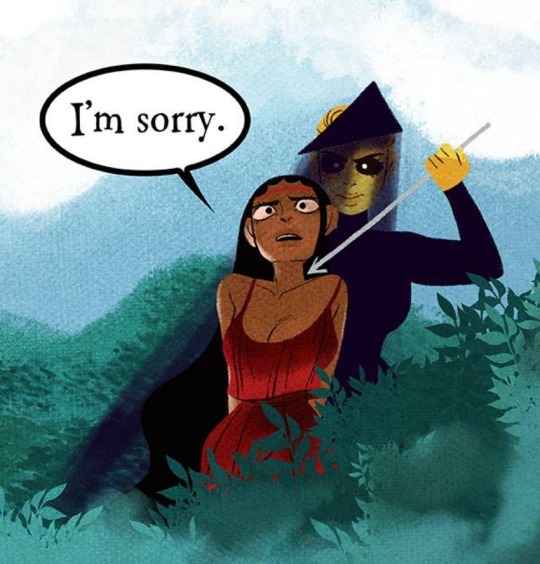
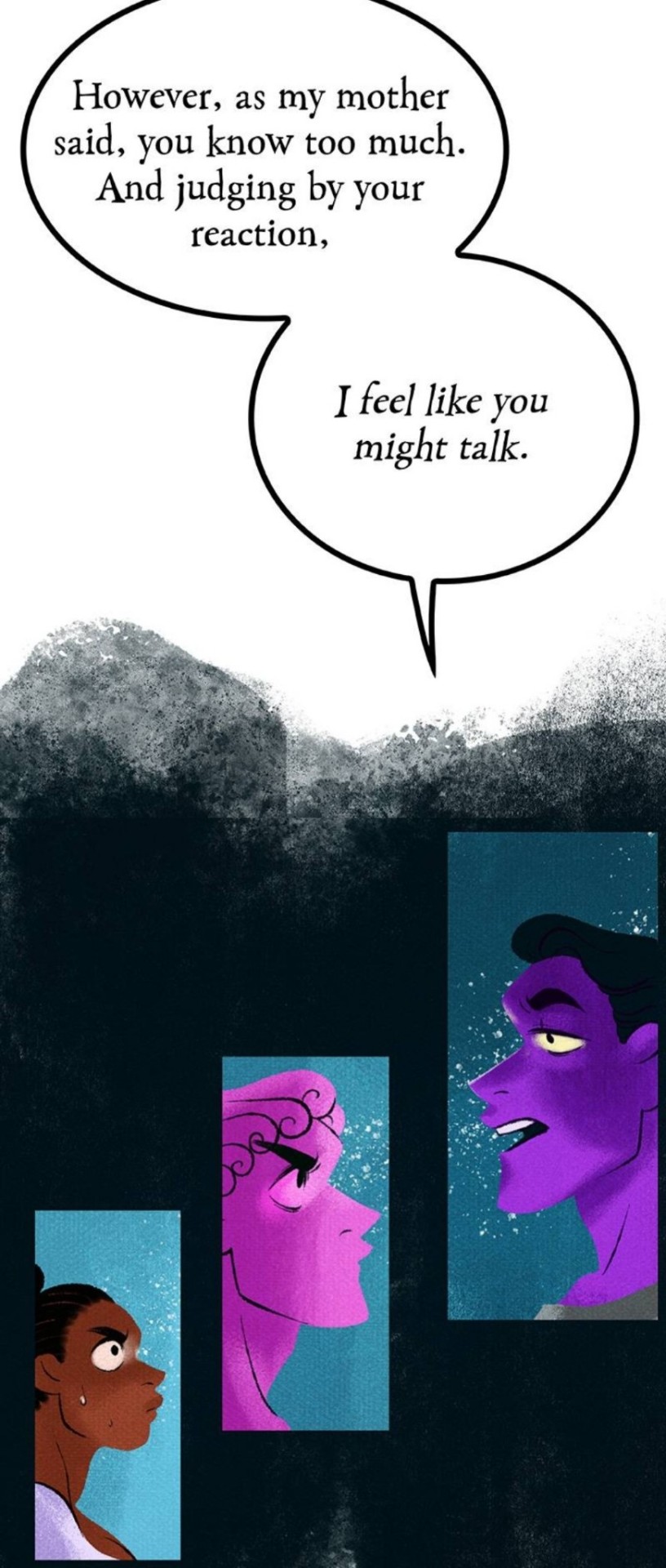
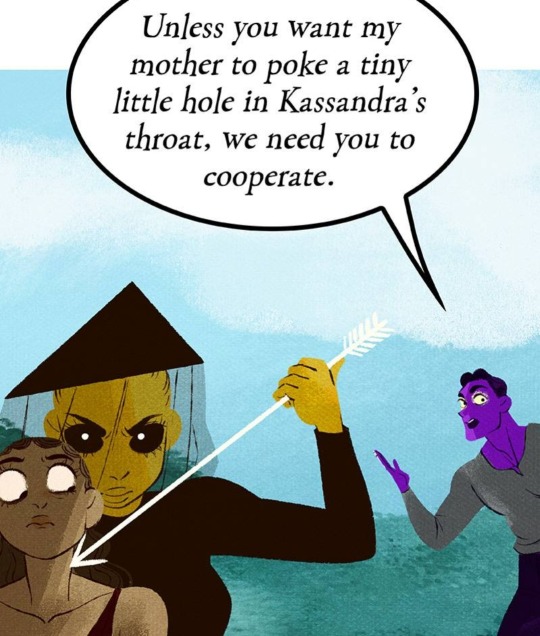
...Apollo's got his Mom as his backup with his bullshit.
What pisses me off more is that Leto actually believes her son's bullshit. Like, I get that Zeus & Hera both shafted her when she was pregnant with Apollo and Artemis, but I'd like to believe that SOMETHING had to come off as odd to her about her son. However, given that I don't think she knows Apollo SA'd Persephone, there might be a lot more that Leto doesn't know (and should) about her son's deeds.
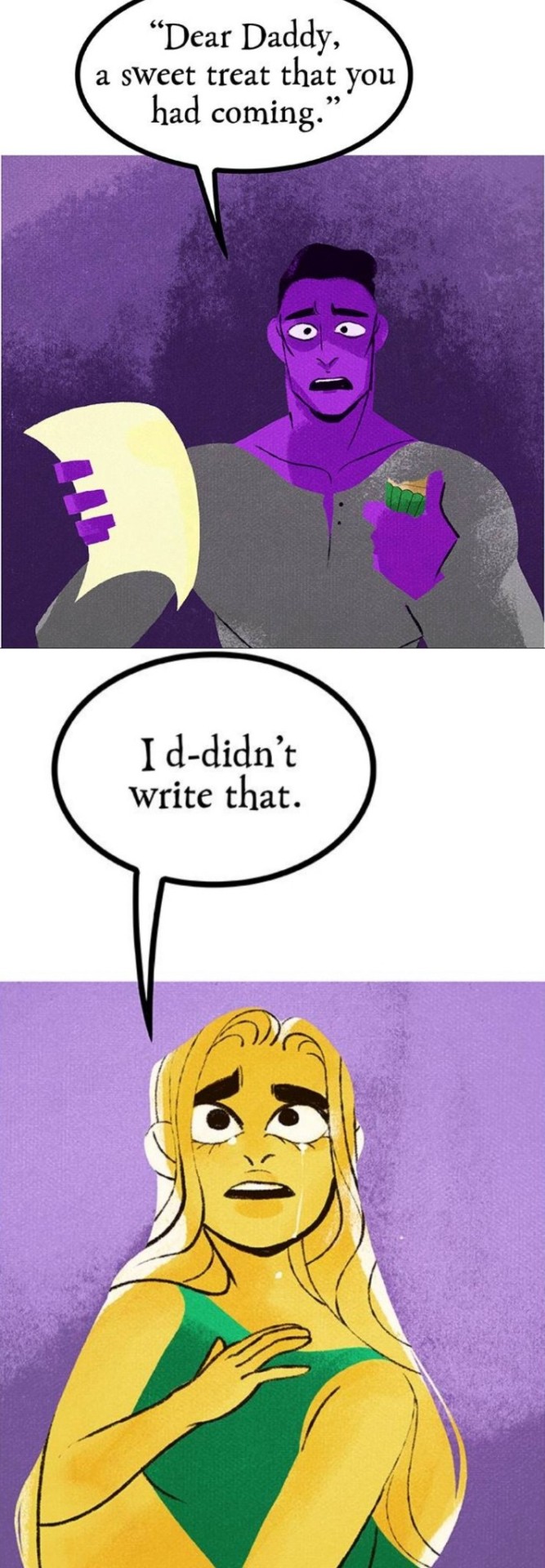
And Apollo doesn't stop at just Eros & Psyche. He signed the note as Hebe intentionally to get her out of the way without having to jail her. Ugh!

While Apollo is cleaning out the palace, Persephone is having a serious crisis --- Everything is turning to winter.
From some of her thoughts, snow and winter were a legend of the past, but that it hasn't happened in who knows how long. I wonder if autumn was just an extra long season until Persephone ate the pomegranate.
Needless to say, Demeter is furious that her daughter's very purpose is just flat-out gone. Naturally, she blames Hades, and for once, she's probably not wrong.
[IN B4 YES, PERSEPHONE ATE THE POMEGRANATE OF HER OWN FREE WILL.]
Could we blame Apollo's machinations for this? Possibly. It could be something related to the prophesy, but I don't think this is the case. In terms of Rachel's method of storytelling, there could be a deeper connection to the prophesy of Apollo's takeover.
I think Persephone causing winter instead of spring here was more a part of what she gave up when she ate the pomegranate. If my theory of there being an extra-long autumn is the case, then the pomegranate deal meant that winter happened instead. Persephone had to spend a whole half of the year in the Underworld instead of just 3/4 of it. That would likely put things more in line with not only the real world, but with the original myth as well.
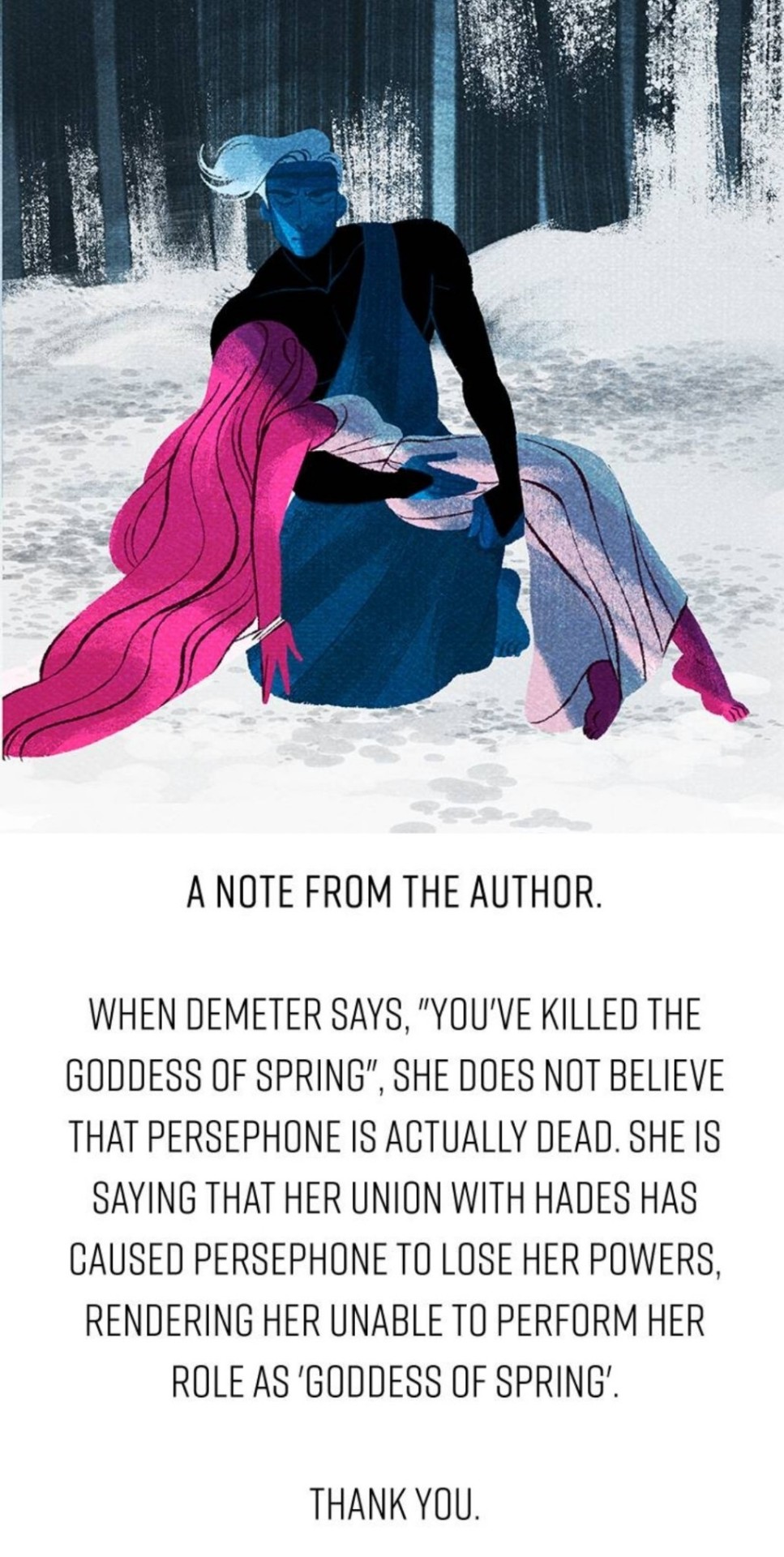
I was going to put this bit in my own words, but Rachel just came right out and said it, so I don't have to.
I know that I and other LO fans have made guesses and speculations that turned out to be incorrect before. It happens. I know I've guessed wrong before. I think in this instance, Rachel didn't want an incorrect assumption to be made right out of the gate and nipped it in the bud immediately.
Anyway, thanks for coming to my LO post!
#lore olympus#lo apollo#lo eros#lo psyche#lo leto#lo persephone#lo hades#lo demeter#LO HOSTILE TAKEOVER
32 notes
·
View notes
Text
On Captain Jas. Hook’s timeline: a trick of narration and metatextuality
To most, Captain Hook is, and always will be, Peter Pan’s greatest foe; but that would be without taking into account James Matthew Barrie’s lifework: fleshing out what remains to be his most thorough character.
Sixteen years after the publication of the 1911 novel of Peter Pan, and twenty-three years after the first apparition of the eponymous character on stage, it was not the boy who couldn’t grow up who was chosen to be the center of Barrie’s speech at Eton; neither was it Wendy Darling - by many accounts the true hero of the story. Instead, Eton’s provost sent the following prompt to the revered author: “James Hook, the pirate captain, was a great Etonian, but not a good one”. It was the author’s role to refute this statement; which he did, and magnificently so. But what we learn from this speech seems contradictory from what had been established from the novel... Unless you study it by taking into account Barrie’s chief characteristic as an author: he is, and is remembered as, a wonderful storyteller.
Barrie’s style in Peter Pan (1911) is remarkable as he constantly steps away from his role as a narrator and reveals his hand in spinning the story as its author. For instance, in chapter 5, the narrator/author placidly remarks:
“Let us now kill a pirate, to show Hook's method. Skylights will do.”
We switch from description to action as the narrator dictates; and as such, the narrator shows that he is not only narrating, but also choosing how the story goes along. This kind of storytelling is traditionally used orally; here, it feels as though the written text is alive, being spoken as we read. Funnily enough, this kind of narration isn’t confusing for children at all; instead, it reinforces the fictional aspect of it all. The children reading musn’t fear for Peter or Wendy or the Lost Boys; for it remains, after all, a story.
But is Barrie only using metatextual tools to reassure the children? A closer look at the text shows otherwise.
It’s one thing to write the story as though it were told orally; it is another to create doubt in the mind of the reader by slipping in-and-out the diegesis. Often, the author relates the events as though they had been shared with him by someone else; to keep in mind the fifth chapter of the book, we can read:
“I have been told that he [Captain Hook] was a raconteur...”
And this recurrent use of “being told”, “having heard”, etc., suddenly fleshes out this fantastical world, by connecting it to the seemingly actual life of the author. Not only does Barrie tell and shape the story to his will, but he seemingly takes elements from his friends, acquaintances, and other faceless and nameless figures that only serve to give credit to his story.
This fascinating blur between real and the fake has also been manipulated by other great authors to the destination of children: one of the most famous examples might be none other than “Lemony Snicket” of the Unfortunate Events series. And there might have been some inspiration from Barrie when writing the thirteen mystery books; for Barrie often appears as an investigator himself.
Indeed, his 1927 lecture is not only a reply to the prompt given to him a month prior, but an investigation; as Brian Till puts it in his article “The Secret History of Captain Hook”,
“Barrie takes the tone of an investigative reporter or prosecutor-judge, dutifully presenting the facts he has found.”
In his speech, and in order to “prove his case”, Barrie presents not fiction, but facts - heard from acquaintances and friends. Barrie mentions names as one would call witnesses to the bar: Mr. Jasparin, or Hook’s Aunt Emily, provide accounts which have to be taken for granted. It becomes difficult to keep in mind it is all fiction, as James Matthew Barrie remains ambiguous of what his actual role might be: both author, narrator, investigator, and witness.
Allow us, after having presented our facts, to round them up with the actual question at hand: what is Captain Hook’s actual timeline? This question might be asked by whoever read both the novel and Barrie’s lecture. Indeed, if one takes into account the novel, Hook is a contemporary of Stevenson’s Long John Silver (the “Sea-Cook”); thus, an 18th century-pirate. However, if one takes into account the latest additions Barrie made with his Eton speech, Hook is a contemporary of Barrie; thus, a 19th century pirate. It is known that only Peter Pan remains forever young; his Lost Boys grow up and are replaced by others. Therefore, it is out of the question to consider that Hook managed to live for over a hundred years.
So while both descriptions can be considered canon, which is actually real?
The following extract is from Hook’s description in the novel:
“In the midst of them, the blackest and largest in that dark setting, reclined James Hook, or as he wrote himself, Jas. Hook, of whom it is said he was the only man that the Sea-Cook feared. [...] In manner, something of the grand seigneur still clung to him, so that he even ripped you up with an air, and I have been told that he was a raconteur of repute. [...] A man of indomitable courage, it was said that the only thing he shied at was the sight of his own blood, which was thick and of an unusual colour. In dress he somewhat aped the attire associated with the name of Charles II, having heard it said in some earlier period of his career that he bore a strange resemblance to the ill-fated Stuarts...”
What transpires from this entire description are the many marks of hearsays (which have reached both Barrie’s ears and, more interestingly, Hook’s). “Of whom it is said...”, “I have been told...”, “it was said...”, “having heard it said...”; all these are proofs that none of these descriptions come from first-hand accounts.
These second-hand accounts somehow differ from the accounts given in Barrie’s lecture at Eton in 1927; in the novel, Aunt Emily or Mr. Jasparin are nowhere to be found - which also means there are no “reliable” sources for these comments on Hook’s character. In the novel, these comments remain sourceless - thus, vague and unreliable. While Barrie turns himself into an investigator for his Eton speech, his intention isn’t the same with the Peter Pan novel. The novel is destined for children, and as such, it makes sure the children feel impressed by the main foe of the novel. In order to accomplish that, it creates a villainous (and by extension, mysterious) aura to wrap around Hook’s shoulders: what can be more impressive than the man itself, if not the man’s reputation?
Therefore, while the most plausible, but perhaps not the most satisfying, reply to the question is saying that Barrie hadn’t planned to make a lecture about Hook more than twenty years after his first apparition (which explains the time difference between both descriptions), one can offer an alternative.
Captain James Hook might very well be a 19th century Etonian who happened to stumble into piracy and chose to contribute to his fearsome reputation by encouraging, if not starting himself, rumors about his encounters with fantastical 18th century pirates such as Long-John Silver. After all, isn’t Hook known to be a talented “raconteur” himself? As a storyteller, Hook has the capacity to re-invent himself; we know that even his appearance is fashioned after that of 17th century English King Charles II, blurring the timeline even further. By incarnating the very idea of a timeless pirate, deliberately mixing elements from three different centuries, Hook conceals himself from his own mortality - even if, in the end, it isn’t enough to avoid his fate.
The similarities between James Hook and James Barrie are many, and most certainly not fortuitous; these resemblances might culminate in their capacity to spin a story to their will, as Hook chooses to reshape his own image, while Barrie reshapes Hook. In the end, it is difficult to understand where one begins and where one ends; the only thing that remains certain, is that there is still many a mystery left within the intricate text that a peculiar storyteller left us with.
#reposting this analysis which i had already published on a now deleted blog#then again it all depends on wether you consider the Eton speech 'canon' or not#captain hook#captain james hook#peter pan#peter pan and wendy#jm barrie#j.m. barrie#metatextual analysis#james hook
66 notes
·
View notes
Text
Hetalians (including poc hetalians) seeing a poc do or say something they don't approve™ of:
"Well you're not REALLY Chinese/Filipino etc because a REAL Chinese/Filipino wouldn't do that"
"You're acting like a white person"
"You're basically white"
"You don't have a right to go by this identity because XYZ"
"You don't have a right to have an opinion on this because your identity isn't valid for XYZ reasons"
Weird how nearly all of my hate anons were accusing me of trying to police poc because of a personal opinion on fandom matters... Meanwhile literally policing me and my identity.
You don't know me, you don't know my life story or family history, you don't know my experiences with my identity and as diaspora living in a majority white country having to put up with years of racism, even from the white side of my family. You don't know my connection with my Filipino community and friends I've had for over a decade or my connection with my family who live in the Philippines.
To tell me "well u just revealed ur wasian so why are you playing the poc and Filipino card ://" as if you have a fucking right to tell me what I can identify as, as if you are some fucking all powerful God who has the right to dictate what mixed people identify as just because you're a mainlander or not mixed or simply because we behaved in a way that you think we shouldn't have or identify in a way you think we shouldn't because we didn't meet this or that requirement, as if our identities aren't already complicated enough for us.
I literally leave anonymous off for weeks and that is the first anon I get in my inbox. Are you fucking kidding me.
I'm allowed to say "as a poc." I'm allowed to say "as a Filipino."
BECAUSE I AM LITERALLY THOSE THINGS. THAT DOES NOT MEAN I AM DENYING MY WHITENESS. HAPAS ARE WHOLLY BOTH OF THEIR IDENTITIES.
I AM A FILIPINO. I AM BRITISH. SAYING I AM ONE OR THE OTHER ISN'T HIDING HALF OF MYSELF.
Of course, everyone who sent me asks like this are on anonymous.
This fandom is an absolute cesspit.
Anyways this is me @ all of my racist hate anons
27 notes
·
View notes